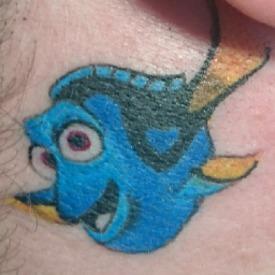Is my heart rate during exercise safe?

armydreamers
Posts: 175 Member
I'm 36 and just recently started exercising regularly. I'm 5'7" and 152 lbs. so not terribly overweight but definitely out of shape. I just got a Fitbit charge HR to track my heart rate during rest and exercise. My goal is to lose about 15-17lbs but my main reason for starting to exercise regularly is health. I'm doing a pretty intense 60 minute cardio workout with body weight exercises at the end. According to the Fitbit, my average bpm during the workout is 134 but gets as high as 186!! And who knows if it's accurate so it may be higher. Is it safe to get that high?
0
Replies
-
That's right at your limit. A good rough estimate of what you should limit your heart rate to is 220 - [Your Age]. Anything over that is not going to get you in shape any faster and could end up hurting you.0
-
based on a the basic general rule for determining max heart rate (220-age), your max heart rate is 184. But this number is just an approximation. And as you increase your cardio health, your resting heart rate will decrease and it will take increased intensity of activity to reach your max.
Target heart rates zones are as follows:
light activity 50-60% max heart reate
moderate activity 60-75%
intense activity 75-90%
0 -
I've wondered about this myself, so thanks for the timely question!

My resting heart rate is pretty low - usually 58-63 but I've seen it drop below 50 - but even doing a moderate 'workout' using the Wii Fit gives me an average of ~130 and I saw it hit 180 at one particularly exuberant point yesterday. It does return to normal fairly fast, which I guess is a good thing?
So if I may add to your question - going by Phil's estimate, at 50 yrs old ~170 is my maximum but how long is it safe to keep it high? It only gets into the 160s/170s in short bursts, but I seem to be hitting an average in the 130s every day (I only do about 1/2 hour per day of mild to moderate exercises, I need to start gently as I'm so unfit! )
)
0 -
I've wondered about this myself, so thanks for the timely question!

My resting heart rate is pretty low - usually 58-63 but I've seen it drop below 50 - but even doing a moderate 'workout' using the Wii Fit gives me an average of ~130 and I saw it hit 180 at one particularly exuberant point yesterday. It does return to normal fairly fast, which I guess is a good thing?
So if I may add to your question - going by Phil's estimate, at 50 yrs old ~170 is my maximum but how long is it safe to keep it high? It only gets into the 160s/170s in short bursts, but I seem to be hitting an average in the 130s every day (I only do about 1/2 hour per day of mild to moderate exercises, I need to start gently as I'm so unfit! )
)
wii fit is not accurate at all when it comes to those things. so dont rely on that to give you an actual heart rate number.0 -
CharlieBeansmomTracey wrote: »wii fit is not accurate at all when it comes to those things. so dont rely on that to give you an actual heart rate number.
Oh, I don't get the number from that - it comes from my wristband that's measuring my pulse directly. I don't even rely on the Wii for my weight, it fluctuates so wildly that I don't believe it's accurate (maybe because the board is on a carpet, not a hard floor). I just use it for the exercises.
0 -
Are you absolutely sure it's getting that high? Does it get progressively higher or does it spike at the higher rate? A normal heart gradually changes rate as it adapts to the demands placed upon it. An abnormal heart can jump instantaneously into a very rapid rate. A doctor would have to order a special test with you wearing a continuous monitor to determine this.0
-
220-age is inaccurate for 50% of the population. You can't know if your exercise HR is in a normal range unless you test for a decent estimate of your maximum HR. You should also know your resting HR.
Keep in mind, max HR varies very little over your lifetime*, and has no correlation to health, fitness, or athletic ability. So don't flip out and run to see a cardiologist if you turn out to be someone with a high max HR.
Resting HR and the speed at which your heart rate decreases when you stop exercise are the two parameters commonly measured that are related to fitness and/or cardiac health.
*ETA: Barring atrial fibrillation and other abnormalities that are not very likely if you have no other symptoms.0 -
A sudden spike could also be a glitch in the hr monitor reading. I had this problem last year with my chest strap and when I started using proper gel on the electrodes, it stopped. Mine shot up to 226 or some idiotic number once.0
-
My resting heart rate seems to be between 70-80. Is that bad? I'm hoping my new routine of regular exercise will help to lower it.
 0
0 -
armydreamers wrote: »average bpm during the workout is 134 but gets as high as 186!! And who knows if it's accurate so it may be higher. Is it safe to get that high?
My first thought is is that all...
I wouldn't set much store by FitBit readings though.
Anyway. Your RHR is fine, could be a good bit better. There is nothing wrong with working at high intensities, as long as you don't have an underlying medical constraint. The challenge you have is the amount of work you can do at higher intensities is much reduced, so you may not be getting the best from your training.
I do the majority of my running at between 140-160bpm, with about one session per week in the 180bpm range and subject to my plan a session that takes me up to 200bpm peaks.0 -
I wouldn't worry about the 220-age thing
208-(agex0.7) replaced it but even then it can be out by 20bpm on an individual basis
Focus on how quickly it comes down0 -
When I first started doing intense excersise, my heart rate would reach 185, I would feel very warm but not too out of breath that I couldn't have a conversation. I got used to the excersise and heart rate doesn't get as high now unless I work harder. This took about 3 months, gym about 3 times a week0
-
22, Male and 230ish lbs. So I'm pretty overweight so it requires a little more effort for me to exercise.
Been running on the treadmills at the gym for about 5 months now. After a warm-up, I start running and my HR tends to climb to a certain point a few minutes after starting (around 165 - 170) and very slowly increase as I continue to exercise until it gets to about 175-180 after half an hour. Fastest I've ever gotten it to was 188.
I tend to view my fitness in terms of how quickly my HR drops after I stop and my resting heart rate (RHR). It takes about a minute for my heart rate to drop about 20 bpm and after 5 minutes of stopping, it's down to 120. It normally stays at 100-120 for the next few hours. And my RHR is normally anywhere between 55-65. It varies on some days.
I shouldn't worry too much about what your actual heart rate gets to when you're exercising and focus more on how you're feeling when you're exercising. Max heart rates vary from person to person and not even a formula can tell you what your's is. So long as you're not getting dizzy or short of breath and feel like you can carry on with no problem, then by all means.
So yeah, sorry for the long read (if you read this anyway) but there's my 2 cents on heart rates and fitness.0 -
That's right at your limit. A good rough estimate of what you should limit your heart rate to is 220 - [Your Age]. Anything over that is not going to get you in shape any faster and could end up hurting you.
It's funny because I had to see a doctor for heart rate issues and my hr was sometimes in the 180s. He told me about the 220 minus my age, making my max heart rate right at the upper normal limit. Ended up having to have a catheter ablation anyway because during an EP study, my hr went to 240.
However there were other symptoms such as palpitations, I could feel my heart beat very fast.
So OP, if you're exercising and worried about your hr, you can always go to a doctor to make sure you're ok. If you feel a strong heartbeat or like you're skipping beats [it'll feel like getting kicked in the chest], then something is up and it warrants further investigation.0 -
I wouldn't worry about the 220-age thing
208-(agex0.7) replaced it but even then it can be out by 20bpm on an individual basis
Focus on how quickly it comes down
Both formulas give the same number for a 40 year old. They move a bit one way or the other depending which side of 40 the person is on, but not much. As mentioned, the speed the rate comes down is a bigger deal.
http://www.livestrong.com/article/448974-how-long-after-working-out-does-your-heart-rate-return-to-base/
Agree the formulas don't work well in many cases. As an example of 1, I got to 192 beats per minute during an exercise test at a university lab in my mid 50's.0 -
My HR was around 170-180 but now I have to work to get it that high. However, when I'm running, it works its way up to 190. I'm 46 and weigh 170. I'm overweight for sure, but not that much out of shape. I've had all sorts of testing done and my heart is fine. Because my HR drops down fairly quickly, the Dr's and trainers aren't worried about it. It's normal for me.0
-
A lot of advice by well intentioned people. Something like this calls for a visit to your MD! You should talk to your Dr about what's healthy and what's not and what's safe and what's not! Then you will have your answer.
If not your Dr, then a certified Athletic Trainer, not a Personal Trainer who could get their certificate online, but an Athletic Trainer who has a BA degree and 1000's of hours working with athletes.0 -
latineyes2 wrote: »A lot of advice by well intentioned people. Something like this calls for a visit to your MD!
I don't think it really needs a clinician to answer the question of whether it's safe to train in the low aerobic range, as a general question.
I'd suggest that you're overreacting...
Except in the general sense of I'm about to start exercising, anything to be cautious of sense.
RHR isn't outlandish and the ave HR is pretty low.0 -
I get up to the low 190's during high parts of HIIT but I've never asked my doctor about it0
-
Thanks guys!0
-
I used to worry about that too.. Then I thought how foolish it was to worry, if your heart is healthy. If I was running away from a Grizzly bear or having great sex would I care what my heartrate was? Nope.0
-
CharlieBeansmomTracey wrote: »wii fit is not accurate at all when it comes to those things. so dont rely on that to give you an actual heart rate number.
Oh, I don't get the number from that - it comes from my wristband that's measuring my pulse directly. I don't even rely on the Wii for my weight, it fluctuates so wildly that I don't believe it's accurate (maybe because the board is on a carpet, not a hard floor). I just use it for the exercises.
oh ok gotcha
0 -
You should ask your doctor.
I'm encouraging you to do that, and not being trite. I had a stress test done by a cardiologist, and he told *me to ignore all the "220-" rules and everything posted at the gym. I had it done, in part, b/c my IRL friends were freaking out about my high workout HR - when I felt fine. You probably won't get to the point of having a stress test done. I have a family genetic issue, and also have some EKG abnormalities, so he thought it would be good to do the test on me to be sure.
But ask your doctor - soon if you are worried; at your next checkup otherwise.
In general, your resting HR is high for your age, but will also likely come down nicely as you continue your activity. But your workout HR sounds fine.0 -
armydreamers wrote: »I'm 36 and just recently started exercising regularly. I'm 5'7" and 152 lbs. so not terribly overweight but definitely out of shape. I just got a Fitbit charge HR to track my heart rate during rest and exercise. My goal is to lose about 15-17lbs but my main reason for starting to exercise regularly is health. I'm doing a pretty intense 60 minute cardio workout with body weight exercises at the end. According to the Fitbit, my average bpm during the workout is 134 but gets as high as 186!! And who knows if it's accurate so it may be higher. Is it safe to get that high?
Yup, that's totally fine. At your age I was always hitting up into the 190's during HIIT. Now at age 54, the old ticker beats slower for the same effort. So I routinely go up to 179-181 for my most intense short duration outputs on the bike (steep climbs and full out sprints at race speed). Those would be my VO2Max intervals from this chart below. If I push it beyond that into the Anaerobic Capacity and Neuromuscular (a few seconds to 30 seconds max) it costs me an awful lot and is hard to recover.
The more "in shape" you get, you'll see your resting heart rate lower. My resting HR is about 52 after a cup of coffee in the morning resting in bed. When not trained, it can be in the 60's - 70's for me.
Most likely during your workouts at the end with the body weight exercises, your HR gets up in the Threshold to V02Max for short durations. There's nothing wrong with that! We cannot sustain V02Max for very long durations (3-8 minutes), but the Threshold we can.
Good link here on HR Zones, typical maximum durations of each and what not...
http://home.trainingpeaks.com/blog/article/power-training-levels0 -
When I was in my early 30s ... so that 220-age thing would have totalled about 188 ... I would hit 194 cycling up steep hills. That was a "seeing red" situation ... I would literally see red when I hit that sort of heart rate.
Because I do have two damaged heart valves, I went for a whole battery of heart tests, and the Drs and Cardiologists determined that I was OK. They also confirmed that the 220-age thing can be right ... and it can be wrong too.
In my late 30s I was doing running sprints as a part of a physical education class in university ... teaching us to teach physical education. I was wearing my HRM, and hit 197 several times.
If you have reason to be concerned ... see a Dr. Otherwise hitting 186 now and then could be normal for you. Especially if your usual exercising HR is around 136.armydreamers wrote: »My resting heart rate seems to be between 70-80. Is that bad? I'm hoping my new routine of regular exercise will help to lower it.
As for this ... 70-80 is a bit high. Is that your HR when you wake up in the morning, but before you get out of bed?
0 -
Do you have any medical reasons to be concerned about high HR? No? Good. Did you die? No? Good.
You're fine.0 -
latineyes2 wrote: »A lot of advice by well intentioned people. Something like this calls for a visit to your MD! You should talk to your Dr about what's healthy and what's not and what's safe and what's not! Then you will have your answer.
If not your Dr, then a certified Athletic Trainer, not a Personal Trainer who could get their certificate online, but an Athletic Trainer who has a BA degree and 1000's of hours working with athletes.
Aside from the fact that any inactive person starting an exercise regimen SHOULD have a full check up - you are wrong. The information people have been posting is generally correct.
As people have mentioned:
- HR in the upper 180s for intense work out for someone in their 30's starting out are not abnormal.
- return to base rates are more important
- focus more on how you're feeling when you're exercising. Getting dizzy, short of breath, shaking, pain or other signs should be looked at right away.
Do see a doctor regularly.0 -
armydreamers wrote: »My resting heart rate seems to be between 70-80. Is that bad? I'm hoping my new routine of regular exercise will help to lower it.

Not at all. A normal resting heart rate is 60-100. Athletes are usually on the lower side of the spectrum.0
This discussion has been closed.
Categories
- All Categories
- 1.4M Health, Wellness and Goals
- 398.1K Introduce Yourself
- 44.7K Getting Started
- 261K Health and Weight Loss
- 176.4K Food and Nutrition
- 47.7K Recipes
- 233K Fitness and Exercise
- 462 Sleep, Mindfulness and Overall Wellness
- 6.5K Goal: Maintaining Weight
- 8.7K Goal: Gaining Weight and Body Building
- 153.5K Motivation and Support
- 8.4K Challenges
- 1.4K Debate Club
- 96.5K Chit-Chat
- 2.6K Fun and Games
- 4.8K MyFitnessPal Information
- 12 News and Announcements
- 21 MyFitnessPal Academy
- 1.5K Feature Suggestions and Ideas
- 3.2K MyFitnessPal Tech Support Questions




















